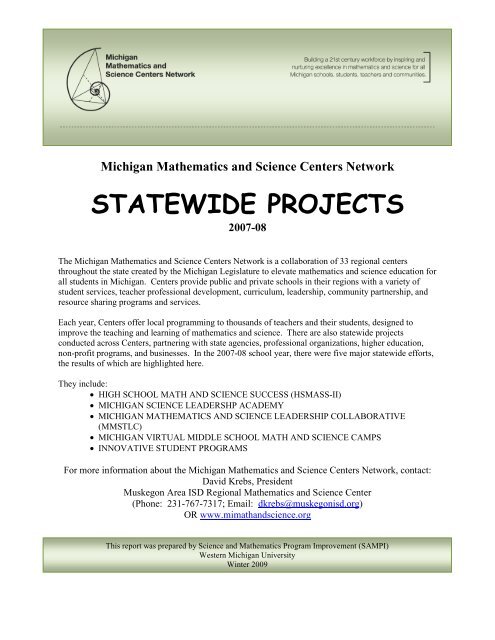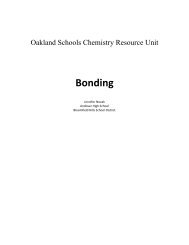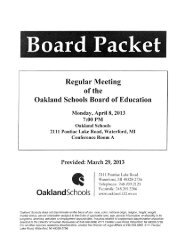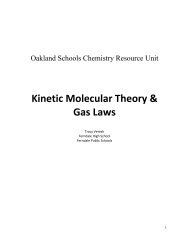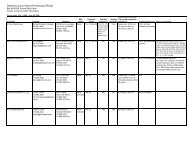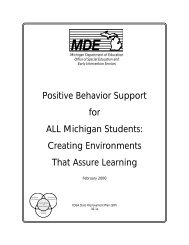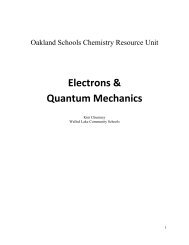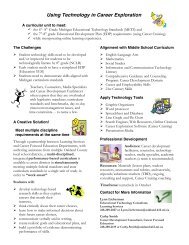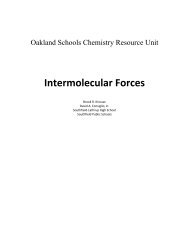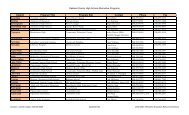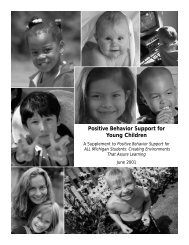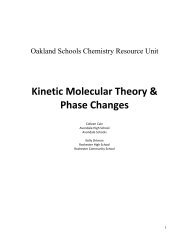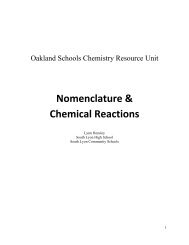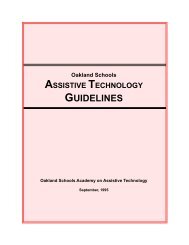Michigan Mathematics and Science Center ... - Oakland Schools
Michigan Mathematics and Science Center ... - Oakland Schools
Michigan Mathematics and Science Center ... - Oakland Schools
Create successful ePaper yourself
Turn your PDF publications into a flip-book with our unique Google optimized e-Paper software.
<strong>Michigan</strong> <strong>Mathematics</strong> <strong>and</strong> <strong>Science</strong> <strong>Center</strong>s Network<br />
STATEWIDE PROJECTS<br />
2007-08<br />
The <strong>Michigan</strong> <strong>Mathematics</strong> <strong>and</strong> <strong>Science</strong> <strong>Center</strong>s Network is a collaboration of 33 regional centers<br />
throughout the state created by the <strong>Michigan</strong> Legislature to elevate mathematics <strong>and</strong> science education for<br />
all students in <strong>Michigan</strong>. <strong>Center</strong>s provide public <strong>and</strong> private schools in their regions with a variety of<br />
student services, teacher professional development, curriculum, leadership, community partnership, <strong>and</strong><br />
resource sharing programs <strong>and</strong> services.<br />
Each year, <strong>Center</strong>s offer local programming to thous<strong>and</strong>s of teachers <strong>and</strong> their students, designed to<br />
improve the teaching <strong>and</strong> learning of mathematics <strong>and</strong> science. There are also statewide projects<br />
conducted across <strong>Center</strong>s, partnering with state agencies, professional organizations, higher education,<br />
non-profit programs, <strong>and</strong> businesses. In the 2007-08 school year, there were five major statewide efforts,<br />
the results of which are highlighted here.<br />
They include:<br />
• HIGH SCHOOL MATH AND SCIENCE SUCCESS (HSMASS-II)<br />
• MICHIGAN SCIENCE LEADERSHP ACADEMY<br />
• MICHIGAN MATHEMATICS AND SCIENCE LEADERSHIP COLLABORATIVE<br />
(MMSTLC)<br />
• MICHIGAN VIRTUAL MIDDLE SCHOOL MATH AND SCIENCE CAMPS<br />
• INNOVATIVE STUDENT PROGRAMS<br />
For more information about the <strong>Michigan</strong> <strong>Mathematics</strong> <strong>and</strong> <strong>Science</strong> <strong>Center</strong>s Network, contact:<br />
David Krebs, President<br />
Muskegon Area ISD Regional <strong>Mathematics</strong> <strong>and</strong> <strong>Science</strong> <strong>Center</strong><br />
(Phone: 231-767-7317; Email: dkrebs@muskegonisd.org)<br />
OR www.mimath<strong>and</strong>science.org<br />
This report was prepared by <strong>Science</strong> <strong>and</strong> <strong>Mathematics</strong> Program Improvement (SAMPI)<br />
Western <strong>Michigan</strong> University<br />
Winter 2009
HIGH SCHOOL MATH AND<br />
SCIENCE SUCCESS-II (HSMASS-II)<br />
STATEWIDE PROJECT<br />
SELECTED FINDINGS FROM THE EXTERNAL<br />
EVALUATION OF HSMASS-II<br />
HSMASS is a statewide collaborative effort of the <strong>Michigan</strong> <strong>Mathematics</strong> <strong>and</strong> <strong>Science</strong><br />
<strong>Center</strong>s Network <strong>and</strong> the <strong>Michigan</strong> Department of Education, begun in 2006 to provide high<br />
school mathematics <strong>and</strong> science teachers with professional development opportunities<br />
designed to help them improve teaching <strong>and</strong> learning <strong>and</strong> increase student success.<br />
HSMASS-II, implemented during the 2007-08 school year, was designed to 1) increase<br />
awareness <strong>and</strong> knowledge of the new High School Content Expectations (HSCE) <strong>and</strong> the<br />
mathematics <strong>and</strong> science companion documents, 2) improve teacher knowledge <strong>and</strong><br />
pedagogical skills related to classroom (formative) assessment, 3) increase student<br />
knowledge about selected mathematics <strong>and</strong> science topics, <strong>and</strong> 4) increase teacher<br />
knowledge <strong>and</strong> skills for preparing instructional activities using the companion documents.<br />
<strong>Center</strong>s across <strong>Michigan</strong> conducted a series of workshops for 8 th -12 th grade mathematics <strong>and</strong><br />
science teachers in their service areas. Below are summary statements based on an analysis<br />
of data collected as part of the external evaluation. Reports based on other evaluation data,<br />
as well as detailed information supporting this report, are available.<br />
• In collaboration with the <strong>Michigan</strong> Department of Education, during the 2007-08 school year, the Network<br />
developed professional development materials, trained facilitators, planned <strong>and</strong> implemented workshops,<br />
<strong>and</strong> conducted a results-oriented external evaluation at <strong>Center</strong>s across <strong>Michigan</strong>.<br />
• The Network conducted half <strong>and</strong> full day workshops, serving 636 high school mathematics teachers <strong>and</strong><br />
580 high school science teachers.<br />
• Results of a pre/post test of students of participating teachers show an increase in scores pre to post for<br />
both mathematics <strong>and</strong> science across the Network. In mathematics, 90% of the <strong>Center</strong>s exhibited a<br />
statistically significant increase. In science, 87% showed a statistically significant increase. Students were<br />
also asked to report the confidence of their answer. Student confidence increased in both mathematics <strong>and</strong><br />
science.<br />
• Results of a pre/post assessment/survey of participating teachers show a significant increase in mean score<br />
ratings pre to post on all items related to workshop topics <strong>and</strong> activities.<br />
• Most teachers indicated very little familiarity with the attributes of formative assessment <strong>and</strong> its application<br />
in the classroom. By the end of the workshop series, they indicated significantly improved familiarity <strong>and</strong><br />
underst<strong>and</strong>ing. There was a statistically significant positive change pre to post.<br />
• There was an increased percentage of teachers selecting the correct answers to items related to classroom<br />
use of formative assessment from pre to post on the teacher evaluation.<br />
• About 80% of math teachers were able to identify at least one of two primary reasons for including various<br />
components in the content expectations clarification documents; science teacher’s ability to identify<br />
primary reasons for including particular information in the science companion documents increased from<br />
pre to post.<br />
• <strong>Center</strong> director interview data indicates HSMASS-II was a powerful way to provide teachers with<br />
important information regarding classroom-level formative assessment <strong>and</strong> test-item writing. Teachers<br />
learned how to more effectively use the mathematics <strong>and</strong> science state-level content expectation<br />
clarification documents.<br />
For more information about the HSMASS-II evaluation, contact Kristin Everett or Mark Jenness at SAMPI<br />
(Phone: (269) 387-3791 or kristin.everett@wmich.edu or mark.jenness@wmich.edu).
STATEWIDE PROJECT<br />
<strong>Michigan</strong> Virtual Middle School<br />
Math <strong>and</strong> <strong>Science</strong> Camps<br />
The Network (MMSCN), in partnership with the <strong>Michigan</strong> Virtual University (MVU), offered on-line<br />
mathematics <strong>and</strong> science camps to middle school students in selected <strong>Center</strong>s across the state. Through<br />
Title II, E-Learning <strong>and</strong> Virtual School Initiatives Grant, <strong>and</strong> <strong>Michigan</strong> Department of Education<br />
funding, camp “scholarships” were made available to <strong>Michigan</strong> students to attend the first-ever<br />
<strong>Michigan</strong> Virtual Middle School Math <strong>and</strong> <strong>Science</strong> Camps. Scholarships were distributed through the<br />
Network.<br />
• Eight <strong>Center</strong>s participated in this first-year effort: Allegan, Dickinson-Iron-Menominee,<br />
Lapeer, Northwoods (Escanaba), Capital Area, Eastern UP, Mason-Lake-Oceana, <strong>and</strong> Wayne<br />
RESA<br />
• 792 students initially enrolled; 527 received Certificates of Participation for completion of the<br />
20-hour program<br />
• Students completing the program could use their participation to meet the new <strong>Michigan</strong> high<br />
school graduation requirements of an on-line learning experience<br />
• <strong>Center</strong> staff facilitated the camps as coordinators <strong>and</strong> teachers; they were trained by MVU<br />
staff; <strong>Michigan</strong> Virtual <strong>Schools</strong> instructors created <strong>and</strong> taught the on-line components of the<br />
camps<br />
• Goal of the program is for students to “strengthen their study habits <strong>and</strong> deepen their<br />
underst<strong>and</strong>ing of key concepts in math <strong>and</strong> science”<br />
• Campers used ExploreLearning gizmos, specially licensed innovative on-line manipulatives, to<br />
challenge “campers to think <strong>and</strong> reason, to solve complex problems, <strong>and</strong> to<br />
communicate their ideas”<br />
• There were 13 sessions of the math camp <strong>and</strong> 8 session of the science camp<br />
• Two-week sessions of 20 hours were provided in three different formats: 1) Onsite<br />
at <strong>Center</strong>s with individual <strong>and</strong> small group h<strong>and</strong>s-on activities, whole group<br />
events, <strong>and</strong> individual on-line sessions; 2) Kick-off day at the <strong>Center</strong>, followed by<br />
students accessing the program on-line from home or elsewhere; <strong>and</strong> 3) Students<br />
enrolling <strong>and</strong> participating entirely on-line from home or other site<br />
The Network-MVU partnership continued <strong>and</strong> exp<strong>and</strong>ed in Summer 2008. Summary reports will<br />
be created as information becomes available.<br />
For more information about the Network-MVU partnership, contact Dee Benjamin, Director,<br />
Dickinson-Iron-Menominee Math, <strong>Science</strong>, <strong>and</strong> Technology <strong>Center</strong> (906-779-2609 or<br />
dbenjamin@diisd.org) or Jamey Fitzpatrick, Director, <strong>Michigan</strong> Virtual University (517-336-7733 or<br />
jfitz@mivu.org)
<strong>Michigan</strong> <strong>Science</strong> Leadership Academy (MSLA)<br />
The <strong>Michigan</strong> <strong>Science</strong> Leadership Academy (MSLA) is a<br />
<strong>Michigan</strong> <strong>Mathematics</strong> <strong>and</strong> <strong>Science</strong> <strong>Center</strong> Network initiative<br />
focused on providing statewide professional development <strong>and</strong><br />
other services to support <strong>and</strong> improve the teaching <strong>and</strong><br />
learning of science. MSLA coordinates statewide science<br />
materials development projects, teacher workshops, <strong>and</strong><br />
dissemination efforts of the Network.<br />
STATEWIDE PROJECT<br />
In the 2007-08 school year, MSLA focused its efforts on two major projects:<br />
• Development of COMPANION DOCUMENTS for the <strong>Michigan</strong> K-7 Grade Level<br />
Content Expectations for <strong>Science</strong><br />
Beginning in January 2008, a committee representing the <strong>Mathematics</strong> <strong>and</strong> <strong>Science</strong><br />
<strong>Center</strong> Network, <strong>Michigan</strong> <strong>Science</strong> Teachers Association (MSTA), <strong>and</strong> the <strong>Michigan</strong><br />
Department of Education (MDE) met monthly to design <strong>and</strong> develop Companion<br />
Documents for grades K-4 <strong>and</strong> 5-7. A writing team made up of individuals nominated<br />
by the <strong>Center</strong>s worked throughout the summer to write the “clarifications” for grade<br />
level expectations. These materials provide classroom teachers with “boundaries to the<br />
content expectations” around eight categories: Clarifications; Vocabulary; Instruments,<br />
Measurements, <strong>and</strong> Representations; Inquiry Instructional Examples; Assessment<br />
Examples; Enrichment <strong>and</strong> Intervention; Examples, Observations, Phenomena; <strong>and</strong><br />
Curricular Connections <strong>and</strong> Integrations. The Companion Documents are intended to<br />
“help teachers <strong>and</strong> curriculum developers design their own lesson plans, select useful<br />
portions of text, <strong>and</strong> create assessments that are aligned with the <strong>Michigan</strong> grade level<br />
science curriculum.”<br />
Dissemination of the Companion Documents. Efforts are underway by the<br />
<strong>Mathematics</strong> <strong>and</strong> <strong>Science</strong> <strong>Center</strong>s Network to “roll out” the Companion Documents to<br />
teachers, schools, <strong>and</strong> districts across the state. Because funds are not available from<br />
MDE, the Network, through the MSLA committee, has “stepped-up-to-the-plate” to take<br />
responsibility for disseminating the materials through a series of workshops across the<br />
state, assuring a broad dissemination to teachers, schools <strong>and</strong> districts.<br />
• Development of Inquiry in Instruction (I 3 ) Materials for the Network’s<br />
Statewide HSMASS Initiative<br />
Drawing on the expertise of staff from <strong>Center</strong>s across the Network, a set of workshop<br />
materials for Phase III of the statewide professional development program, High School<br />
<strong>Mathematics</strong> <strong>and</strong> <strong>Science</strong> Success (HSMASS), were developed. This committee also<br />
organized <strong>and</strong> facilitated a two-day workshop to train <strong>Center</strong>-level facilitators on how to<br />
use the materials to conduct workshops for high school science teachers. The goal of I 3<br />
is to improve the teaching <strong>and</strong> learning of science using research-based inquiry-focused<br />
strategies. Workshops began in Fall 2008 <strong>and</strong> will continue through Spring 2009.<br />
For more information about MSLA, contact<br />
Dr. LaMoine Motz at the Oakl<strong>and</strong> <strong>Schools</strong> <strong>Science</strong>/Math/Technology <strong>Center</strong><br />
(248-209-2378 or LaMoine.Motz@oakl<strong>and</strong>.k12.mi.us)<br />
For more information about the Companion Documents <strong>and</strong> content expectations,<br />
go to <strong>Michigan</strong>.gov/mde<br />
or contact Kevin Richard at the <strong>Michigan</strong> Department of Education<br />
(517-540-6805 or RichardK1@michigan.gov)
INNOVATIVE STUDENT PROGRAMS<br />
In <strong>Center</strong>s across the Network, students have opportunities to learn <strong>and</strong> work in unusual environments; sample science,<br />
technology, engineering, <strong>and</strong> mathematics (STEM) careers; <strong>and</strong> engage in real-world research with practicing scientists<br />
<strong>and</strong> other professionals. Often partnering with business <strong>and</strong> industry, government agencies, non-profit organizations,<br />
<strong>and</strong> individuals, programs are designed to motivate ALL students to pursue STEM subjects in elementary, middle, <strong>and</strong><br />
high school, as well in college <strong>and</strong> adult careers. Interesting <strong>and</strong> exciting opportunities made available through Math <strong>and</strong><br />
<strong>Science</strong> <strong>Center</strong>s, <strong>and</strong> not usually available in their home schools <strong>and</strong> districts, open new worlds to these students.<br />
Accelerated High School Programs<br />
High School students spend half of each school day at <strong>Center</strong>s enrolled in challenging <strong>and</strong> diverse college preparatory programs in<br />
science, mathematics, <strong>and</strong> technology. Equipped with up-to-date science <strong>and</strong> computer labs, students engage in activities to learn<br />
about basic <strong>and</strong> cutting-edge STEM topics.<br />
Many students, as part of their Math/<strong>Science</strong> <strong>Center</strong> experience, are also enrolled in college<br />
courses, where they learn college-level science <strong>and</strong> mathematics subject matter.<br />
Number of Students in Accelerated<br />
High School Programs<br />
In the junior/senior years, students have opportunities to work with mentors, including<br />
physicians, surgeons, computer scientists, chemists, veterinarians, field <strong>and</strong> lab biologists,<br />
<strong>and</strong> other researchers.<br />
Seven <strong>Center</strong>s currently provide accelerated high school programs: Battle Creek area,<br />
Berrien County, Kalamazoo area, Macomb County, Mecosta-Osceola Counties, Oakl<strong>and</strong><br />
<strong>Schools</strong>, <strong>and</strong> Sanilac County.<br />
All grades<br />
0 200 400 600 800 1000 1200 1400<br />
9th<br />
10th<br />
11th<br />
12th<br />
In the 2007-08 school year, 1,227 students were enrolled in accelerated high school programs. At least 99% enter college programs.<br />
Students graduate with ACT scores above state <strong>and</strong> national averages. For example, seniors at Mecosta-Osceola graduated with an<br />
average ACT of 28; a high proportion of students from Berrien County scored over 29 on the same test.<br />
Students who graduate from these programs receive millions of dollars in scholarships for colleges <strong>and</strong> universities in <strong>Michigan</strong> <strong>and</strong><br />
beyond. Many receive cash <strong>and</strong> other awards in state <strong>and</strong> national research competitions.<br />
Innovative Student Services<br />
Many <strong>Center</strong>s provide innovative outreach programming using local resources to provide opportunities <strong>and</strong> meet needs of schools,<br />
teachers, <strong>and</strong> students in their service areas. These highly motivating programs are not otherwise available to schools. Innovative<br />
instructional practices are used to engage ALL students. Below are a few examples of unique programming provided by <strong>Center</strong>s.<br />
<br />
<br />
<br />
<br />
At the AMA ESD/Iosco RESA Math <strong>Science</strong> <strong>Center</strong>’s Sprinkler Lake Education <strong>Center</strong>, students are welcomed to Camp Wilderness<br />
each summer. Both day <strong>and</strong> residential camps are offered. Students explore the natural world in the Huron National<br />
Forest to learn first h<strong>and</strong> about wildlife management, water resources, ecosystems, forestry, etc.<br />
Interactive distance learning in science is available to middle <strong>and</strong> high schools in the Genesee Area Math <strong>and</strong> <strong>Science</strong> <strong>Center</strong><br />
service area. Students in three classes in different schools receive advanced programming from a single instructor <strong>and</strong> are able<br />
to interact with each other <strong>and</strong> the teacher during regular science class periods.<br />
A Math <strong>and</strong> <strong>Science</strong> Career Symposium for middle school girls was provided by the Macomb Math <strong>and</strong> <strong>Science</strong> <strong>Center</strong>, giving<br />
more than 300 students opportunities to interact with women professionals in more than 25 math <strong>and</strong> science-related careers.<br />
The Muskegon Area ISD Regional <strong>Mathematics</strong> <strong>and</strong> <strong>Science</strong> <strong>Center</strong> celebrated its 25 th year of the West <strong>Michigan</strong> <strong>Science</strong><br />
Challenge, a program involving 5 th through 12 th grade students from four counties. To participate, students must conduct science<br />
experiments consistent with scientifically valid methods <strong>and</strong> present their results to judges.
STATEWIDE PROJECT<br />
SUMMARY OF MAJOR ACCOMPLISHMENTS <strong>and</strong> RESULTS<br />
Summer 2006-Fall 2008<br />
Begun in July 2006, the <strong>Michigan</strong> <strong>Mathematics</strong> <strong>and</strong> <strong>Science</strong> Teacher Leadership Collaborative (MMSTLC)<br />
is a statewide partnership among the <strong>Michigan</strong> <strong>Mathematics</strong> <strong>and</strong> <strong>Science</strong> <strong>Center</strong> Network, Gr<strong>and</strong> Valley<br />
State University, Saginaw Valley State University, The University of <strong>Michigan</strong>—Dearborn, The University<br />
of <strong>Michigan</strong>—Ann Arbor, <strong>and</strong> the <strong>Michigan</strong> Department of Education. Purposes of the collaborative are to<br />
develop a cadre of teacher leaders; establish collaborative working relationships among teacher leaders,<br />
school administrators, Math/<strong>Science</strong> <strong>Center</strong>s, <strong>and</strong> STEM (<strong>Science</strong>, Technology, Engineering, <strong>Mathematics</strong>)<br />
faculty; improve mathematics <strong>and</strong> science teaching <strong>and</strong> learning in targeted high priority schools; <strong>and</strong><br />
increase capacities of Math/<strong>Science</strong> <strong>Center</strong>s to sustain support for teacher leaders <strong>and</strong> high priority schools.<br />
• Established 8 core Math/<strong>Science</strong> <strong>Center</strong>-based teams for Cadre I <strong>and</strong> began<br />
capacity-building in 2007-08, continuing into 2008-09<br />
• Established 11 core Math/<strong>Science</strong> <strong>Center</strong>-based teams for Cadre II <strong>and</strong><br />
began capacity-building in 2008-09 school year<br />
• Prepared 58 mathematics <strong>and</strong> science Teacher Specialist Leaders in Cadres I<br />
<strong>and</strong> II to serve more than 200 of their math/science colleagues in about 35<br />
schools <strong>and</strong> more than 20,000 students<br />
• Distributed $1.6 <strong>and</strong> $2.0 million respectively to Cadres I <strong>and</strong> II to support<br />
their work in improving mathematics <strong>and</strong> science teaching <strong>and</strong> learning<br />
• Offered competitive grants to Cadre I teams totaling $320,000<br />
• Created a website (www.mmstlc.net) for general audiences, with links to<br />
sites for MMSTLC teams to access resource materials<br />
• Provided more than 125 hours of state-level professional development over<br />
1.5 years to Cadre I teams, including about 60 hours devoted to math <strong>and</strong><br />
science content <strong>and</strong> pedagogy* <strong>and</strong> ~40 hours to building leadership skills<br />
• Provided 78 hours of professional development to Cadre II teams in their<br />
first eight months, including about 27 hours of math <strong>and</strong> science content <strong>and</strong><br />
pedagogy* <strong>and</strong> ~20 hours building leadership skills<br />
• Supported four-month sabbaticals for 9 Cadre I Teacher Leaders <strong>and</strong><br />
release time for 19 (working in teams in their schools) to enhance their<br />
capacities to help colleagues improve math/science teaching <strong>and</strong> learning<br />
• Implemented by Cadre I Teacher Leaders <strong>and</strong> other Core Team Members a<br />
total of 319 PD, student, <strong>and</strong> other MMSTLC activities at the<br />
- Over -
<strong>Center</strong>/school level July 2007-June 2008; a total of 1436 hours provided;<br />
attendance of 4388 across all activities<br />
• Prepared a variety of MMSTLC math/science content <strong>and</strong> pedagogical<br />
instructional, professional development, <strong>and</strong> leadership materials for Teacher<br />
Leaders <strong>and</strong> other core team members<br />
IMPACTS ON CADRE I TEACHER LEADERS<br />
• Results of a <strong>Science</strong> Teacher Leader pre- <strong>and</strong> post-program content test<br />
show total mean scores increased 5.5 points, a statistically significant<br />
change.*<br />
• Results of a <strong>Mathematics</strong> Teacher Leader pre- <strong>and</strong> post-program content<br />
test show total mean scores increased 0.6 points, not a statistically<br />
significant change.*<br />
• <strong>Science</strong> Teacher Leaders’ perceptions of their preparedness to use inquiryfocused<br />
instructional strategies in their science classrooms increased for<br />
selected items, including “Develop students’ conceptual underst<strong>and</strong>ing in<br />
science,” “Lead a class of students in using investigative strategies,” <strong>and</strong><br />
“Assess students’ science content knowledge <strong>and</strong> skills through open-ended<br />
verbal or written responses.”*<br />
• <strong>Mathematics</strong> Teacher Leaders’ perceptions of their preparedness to use<br />
inquiry-focused instructional strategies in their math classrooms increased<br />
for selected items, including “Develop students’ conceptual underst<strong>and</strong>ing of<br />
mathematics,” <strong>and</strong> “Assess students’ mathematical content knowledge <strong>and</strong><br />
process skills through open-ended verbal or written responses.”*<br />
• In the same surveys, both science <strong>and</strong> mathematics Teacher Leaders<br />
indicated an increase in their preparedness to work with their teacher<br />
colleagues on inquiry-focused instructional strategies.<br />
This summary was prepared by <strong>Science</strong> <strong>and</strong> <strong>Mathematics</strong> Program Improvement (SAMPI)<br />
Western <strong>Michigan</strong> University 269-387-3791 1-09<br />
Data in items with an asterisk (*) were supplied by Moore <strong>and</strong> Associates, Inc., Southfield, MI<br />
MMSTLC External Evaluators<br />
For more information about MMSTLC,<br />
contact Walter Rathkamp at SVSU (rathkamp@svsu.edu or 989-964-4117)


